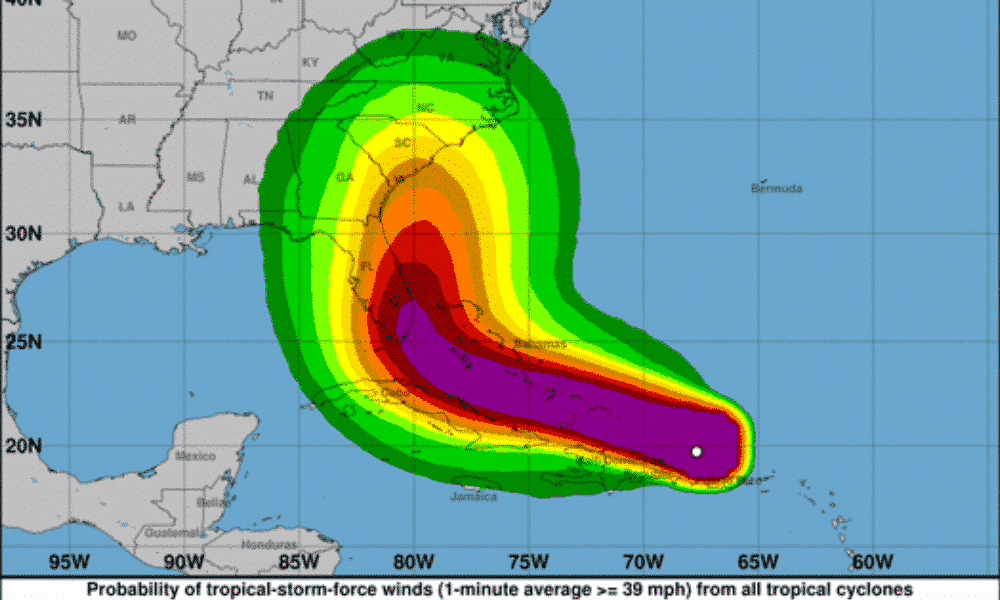
Hurricane season is officially upon us. Whether or not your business is in an area prone to hurricanes, it’s wise to be prepared for the unexpected. Though the threats vary by location, no business is immune to some sort of hazard.
Natural disasters include hurricane, tornado, flood, forest fire, hail, rainstorm, and snowstorm. Man-made disasters include terrorist attack, hostage situation, arson, quarantine, travel restriction, fuel shortage, chemical spill, health epidemic, explosion, and so forth.
This list is not to scare you, but to make you think. We tend to assume business conditions will continue as usual, but this isn’t always the case. When disaster strikes will your business continue operating? Will your business survive?
While the details vary with the situation, here are some general disaster preparedness considerations:
Utility Interruptions
![]() If you lose electrical power, how long can your business continue to operate? Even if you have backup power provisions, batteries will run down, and fuel may not be available (if using natural gas) or will run out (if using propane or gasoline).
If you lose electrical power, how long can your business continue to operate? Even if you have backup power provisions, batteries will run down, and fuel may not be available (if using natural gas) or will run out (if using propane or gasoline).
Also, depending on your location, a lack of heat or air conditioning may make working conditions difficult or even unsafe. The lack of clean water and a working sewer system is a problem anywhere.
Any of these situations may require your staff to leave your office. Without a backup plan, this will force you to temporarily close. And remember, the longer a business is shutdown, the greater the likelihood it will never reopen.
Office Evacuation
![]() In addition to a lack of electricity, natural gas, water, or sewage, your building could become unavailable for other reasons, too. Perhaps staff can’t get to your office due to weather, quarantines, roadblocks, travel restrictions, or a government declaration. On a more horrific level, maybe your building no longer exists – consider the World Trade Center.
In addition to a lack of electricity, natural gas, water, or sewage, your building could become unavailable for other reasons, too. Perhaps staff can’t get to your office due to weather, quarantines, roadblocks, travel restrictions, or a government declaration. On a more horrific level, maybe your building no longer exists – consider the World Trade Center.
If this happens, do you have a backup location? Can staff work from home? Develop a contingency plan for that includes a communication plan for connecting with your team.
Inaccessible Files
![]() Can you access your files and records from a remote location? If your databases and servers are onsite you may not have access to them, or they may contain damaged information.
Can you access your files and records from a remote location? If your databases and servers are onsite you may not have access to them, or they may contain damaged information.
Using a cloud-based applications or a colocation (colo) facility to have a copy of your files or better a redundant server running all of your apps is a great way get to your software when you need it. Have a remote backup storage site or use cloud-based storage to resolve this concern.
Staffing Issues
If a disaster affects your business, it will likely affect your staff as well. They may need to attend to personal issues at home or with their family. If half your staff can’t work, can you scale back your operation, or will your business cease to function?
Communication Challenges
During a disaster, communication systems are often overwhelmed. Sometimes they are compromised. Don’t assume you will have internet access or reliable cell phone coverage. Landlines may be more resilient, and dedicated circuits are best.
Your call center or answering service can play an essential communication role in your disaster plan. Make sure they are aware of your expectations and are ready to handle your emergency communication needs.
Have an Action Plan
Consider these issues in advance. Assume disaster will happen at some point or to some extent. Plan accordingly. Document your plan and make staff aware of it. Then run tests and practice it.
Also consider key vendors, specifically your answering service. Make sure they also have a disaster plan in place. A key element in their plan should be multiple locations in different geographic settings to serve as critical backup sites.
Make sure your answering service has these types of back up provisions in place and is ready when disaster strikes.
Peter DeHaan, is CEO of Peter DeHaan publishing which produces print media periodicals and Internet-based publications, as well as media and informational websites. In addition, and TAS Trader. Notable websites and publications include: TAS Trader, which focuses exclusively on the needs, concerns, and opportunities of the Telephone Answering Service (TAS) Industry. It is written by the TAS Industry and is for the TAS Industry. Connections Magazine, which is the premier magazine for the Teleservices Call Center Industry and is distributed to qualified readers at call centers, contact centers, teleservice agencies, telephone answering services, and telemessaging companies.

